Week 45
Redeeming Discarded Objects
BY MARY TODD BEAM | from The Creative Edge
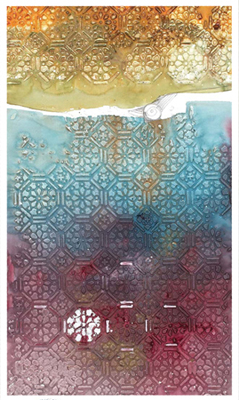
This week, look around you for old, everyday, uninspired items, like a piece of perforated sheet metal, to reuse in your art. Whether it's a discarded auto transmission, old kitchen utensils, or the contents of the wastebasket, the creative artist is always searching for inspiring objects to turn into art. Nothing is off limits as the artist seizes an opportunity for self-expression.
Materials
 acrylic paints
acrylic paints
 illustration board
illustration board
 3″ [76mm] house painting brush
3″ [76mm] house painting brush
 ½″ [12mm] synthetic flat brush
½″ [12mm] synthetic flat brush
 crackle paste
crackle paste
 gesso (white)
gesso (white)
 graphite pencil
graphite pencil
 light molding paste
light molding paste
 multipurpose plastic trowel
multipurpose plastic trowel
 perforated metal sheet or metal stencil
perforated metal sheet or metal stencil
 plastic spoon
plastic spoon
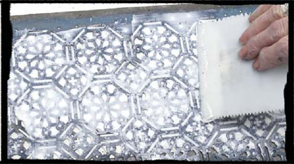
1. Stencil the surface
Lay the metal “stencil” on an illustration board. Using a plastic spoon, scoop light molding paste onto the stencil. Hold the metal still and spread the gel over its surface with a plastic trowel. For variety, add crackle paste to other areas of the stencil.
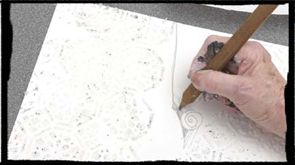
2. Remove the stencil and add linear details
Carefully remove the metal stencil and let this dry. Once dry, use a graphite pencil to add details to define some areas of the design and connect others.
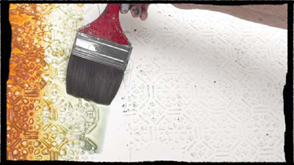
3. Apply paint to the surface
Heavily dilute acrylic paint on your palette with water so the acrylics will flow easily over the surface. Use a 3″ housepainting brush to apply the diluted paint. To make the acrylics flow even more readily, brush some water over this.
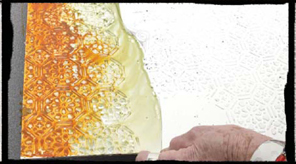
4. Tilt the surface
Tilt the illustration board and let the pigment run over the surface.
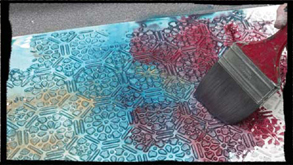
5. Brush on more color
Re-wet the surface before applying more paints. Add drops of paint to the surface and let the pigment disperse. Drop and brush on paint until the surface is saturated with paint. Let the colors mix and mingle with each other. Remember to tilt the surface, letting the paints flow into each other. Let this dry overnight.
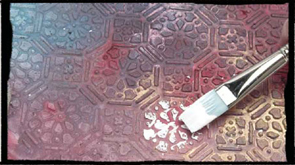
6. Add highlights
Develop a path for the viewer's eyes by adding some light passages with white gesso. Dip a dry ½″ [12mm] flat brush into white gesso and run it lightly across the surface, hitting just the very top of the stenciled pattern.